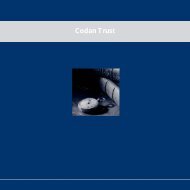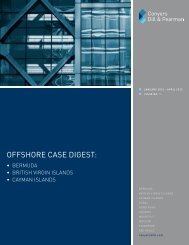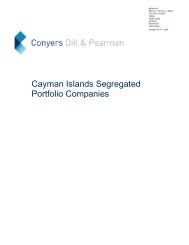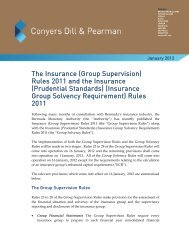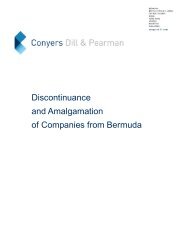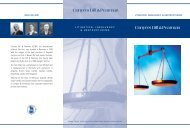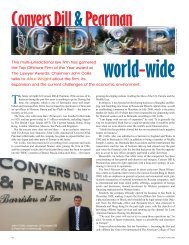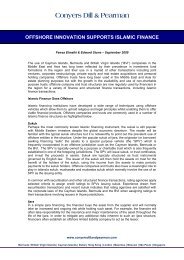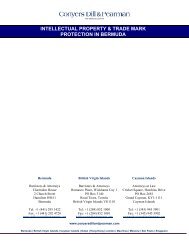OFFSHORE CASE DIGEST: - Conyers Dill & Pearman
OFFSHORE CASE DIGEST: - Conyers Dill & Pearman
OFFSHORE CASE DIGEST: - Conyers Dill & Pearman
You also want an ePaper? Increase the reach of your titles
YUMPU automatically turns print PDFs into web optimized ePapers that Google loves.
CAYMAN ISLANDSAprilCOMPANIES – WINDING UP – INABILITY TO PAY DEBTS– LOSS OF SUBSTRATUMIn the Matter of the Companies Law (2011) Revision and Inthe Matter of FIA Leveraged Fund (The Company”) GrandCourt of the Cayman Islands Financial Services Division,Cause No. FSD 0013 of 2012, per Smellie, C.J. (18 April 2012)The Petitioning investors were owed redemption proceedsby the company. Rather than paying in cash, the companysought to satisfy the redemption requests in specie by issuingpromissory notes. The company’s offering memorandumstated that shares could be redeemed in kind, and providedthat the value of the assets paid out were to be determinedby the board of directors in consultation with the company’sinvestment manager, in the board’s sole discretion. Theinvestors were not satisfied with the promissory notes andapplied to have the company wound up on the basis that thecompany could not pay its debts. Alternatively, the applicationclaimed that the company should be would up on the just andequitable ground, the company having lost its substratum.Following the issue of the writ, the company transferred certainassets into a new Delaware entity and caused the shares inthat entity to be registered in the Petitioners’ names. The Courtfound on the facts that the proposed distribution of sharesdid not satisfy the obligation, as what was paid over did notrealistically represent the value of the investor’s entitlement.The Court also found that the ‘sole discretion’ vested in theboard to value the assets did not give the board the absolutediscretion to effect a distribution which would not givecommercial efficacy to the obligations owed to the investorsunder the contractual documents. The directors’ duties of careand good faith towards the investors were not impliedly sweptaside by the contractual documents. As the assets selectedfor distribution were commercially worthless when measuredagainst the value of the debt it purported to satisfy, the debtwas not discharged. The facts justified a winding up orderon the just and equitable ground as well as on the ground ofinsolvency.COMPANIES – SCHEME OF ARRANGEMENT –MAJORITY IN NUMBERIn the Matter of Sections 15 and 86 of the Companies Law(2011) Revision and In the Matter of Alibaba.com LimitedGrand Court of the Cayman Islands Financial ServicesDivision, Cause No. FSD 38 of 2012, per Creswell, J.(20 April 2012)On an application for sanction of a scheme of arrangementunder section 86, the Court again considered the proper mannerin which the “headcount” aspect of the approval requirementshould be calculated where a custodian holds a number ofshares for investors. The traditional approach of the Courts asto the position of a custodian, assuming it is instructed to votesome of its shares in favour of and some against the scheme,has been to treat the custodian for the headcount test as onevote “for” and one vote “against.” In the Little Sheep case (seedigest above) the petitioner argued that for the purposes of theheadcount test a custodian should be counted as one personhaving voted either “for” or “against” the scheme dependingon its net voting position. This argument was rejected, with theCourt instead finding that it was appropriate to count the partiesfrom whom the custodian receives instructions. The Courtexpressed an inclination to apply the principle of judicial comityand follow the decision of Jones, J. in Little Sheep, he being ajudge of co-ordinate jurisdiction. The Court directed that to theextent that the shares to which the proposed scheme relatesthat a registered in the name of custodians (a) such custodianmay cast votes both for an against the proposed scheme inaccordance with the instructions of its clients, and (b) suchcustodian shall specify the number of votes cast in favour of thescheme and the number of clients on whose instructions theyare cast and the number of votes cast against the proposedscheme and the number of clients on whose instructions theyare cast. Compliance with this direction will then enable theCourt at the hearing of the petition to consider the questionof whether a majority in number has been achieved, havingregard to all of the facts.conyersdill.com • 24





